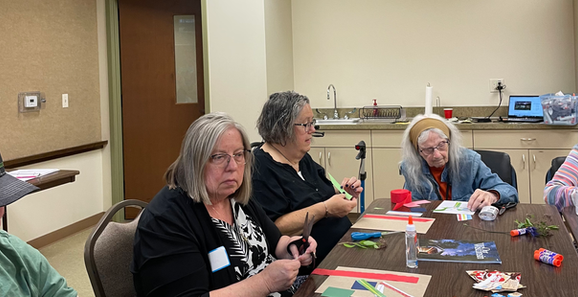Art for the Heart and Mind
- Jun 19, 2024
- 2 min read

A growing body of research shows something that we have all suspected and have perhaps experienced: how happy we are when engaged in a creative endeavor. What we might not have realized is that making art also affects our brains in positive ways.
Art projects are a regular part of the day's activities at Among Friends. Whether it is our latest collage creations or string paintings or watercolors, our participants find joy in expressing themselves and sharing their work with others.

Engaging in art--whether looking at it or creating it--can have very positive effects on people living with dementia. Art therapists at Lesley University have identified 6 benefits of making art for those experiencing memory loss.
Making art with others in a social context can help those with dementia stay connected to their world. While they might not be able to express in words what they are thinking or feeling, they can communicate non-verbally in the shapes or forms they choose or the effect that colors have on them or their companions.
Art provides a means of self-expression and communication. While language might limit a person's ability to express what they are thinking or feeling, a stroke of the paintbrush or a shape or image placed just right on a page might allow the person experiencing dementia a way to express their thoughts or feelings.
Engaging in art can help create new memories. Art therapist Erica Curcio observes: Artwork "is a tangible memory; it's a creation from a moment in time. . . . There's more than words can describe in somebody's artwork--there's a feeling behind it; there are stories behind it. And for some people . . . they remember that they created it, they know the story behind it. For people who don't have language anymore, they might look at their artwork and get very excited about it. They still have that stored memory of that experience and that it was an import moment for them."

4. Engaging in art can lower anxiety and agitation. Because many people experiencing dementia can become anxious and distracted, making art can calm them while providing happiness.
5. Art can help to deal with complex emotions, such as apathy, depression, and anger. By providing artists with a sense of control and giving them choices, they gain confidence.
6. Caregivers can find a fresh perspectives in their loved one's artwork. Artwork can allow a caregiver to connect with their spouse or sibling or parent in a way not necessarily defined by dementia. They can appreciate what their loved one can do rather than what they cannot do.
At Among Friends, we make sure that our participants are not only having fun, but are also engaged with one another and with our volunteers and staff. We want their hearts to be touched and their minds stimulated. Art can be the path that leads to both the heart and mind.














So thoughtfully written and good information about the importance of Art. Thank you.